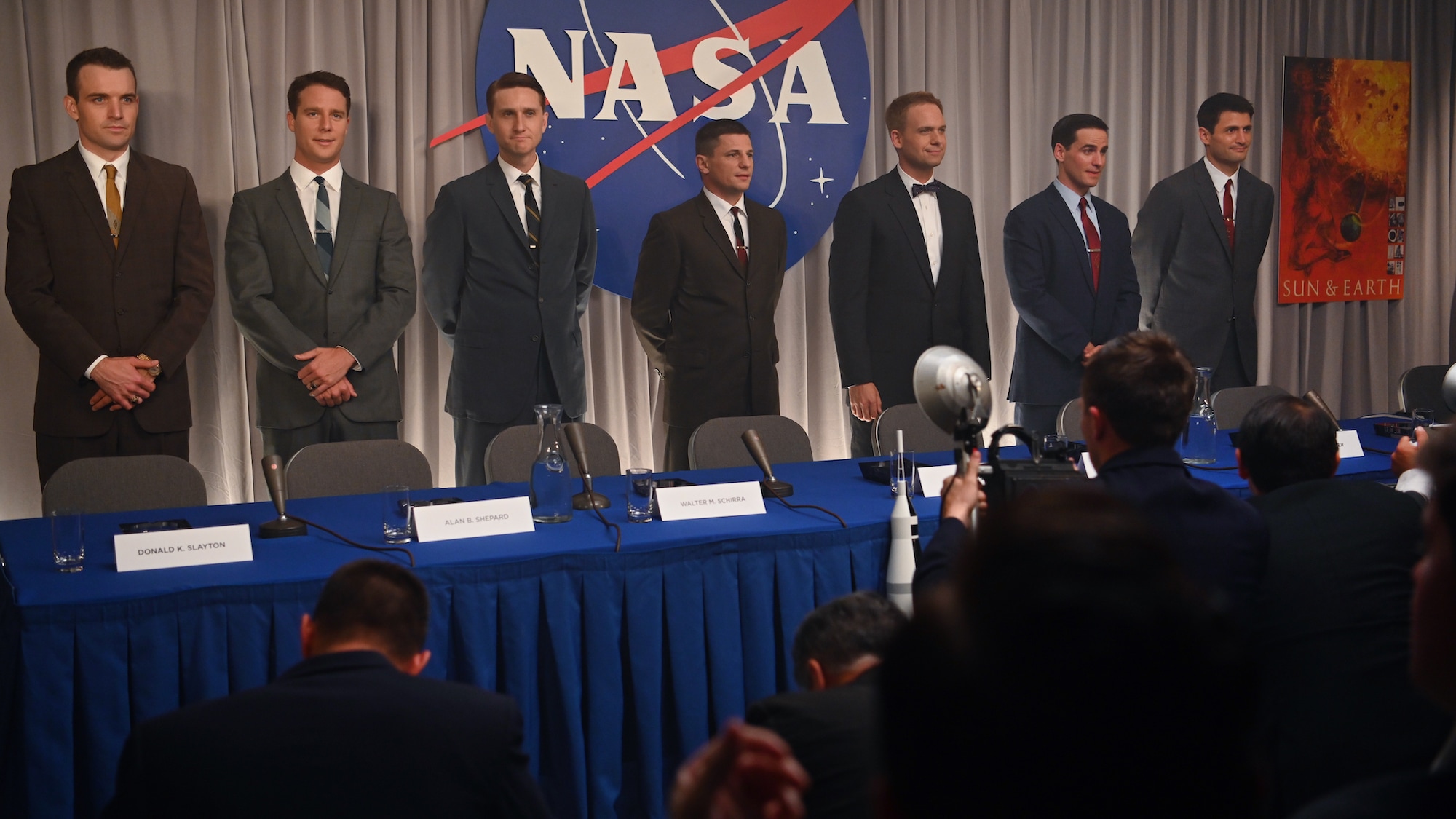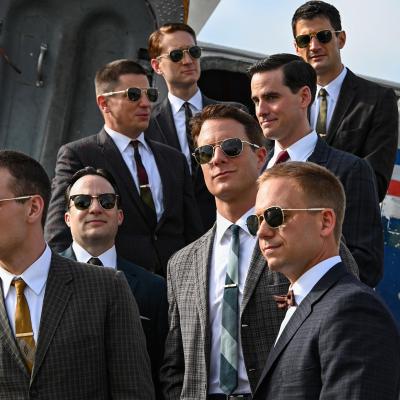This The Right Stuff review contains no spoilers.
It’s impossible to see The Right Stuff, Disney+’s new drama series about NASA’s Mercury 7 astronauts, and not think about the award-winning 1983 film of the same name, but those comparisons don’t do this streaming series version any favors. Where the film is widely and rightly lauded for its authentic and ultimately inspiring depiction of the real lives behind the men who pioneered the U.S. space program, the small-screen version of The Right Stuff never gets off the ground.
On paper, I almost always enjoy an uplifting tale of humanity’s infinite possibility to do and be better than we have been, and regularly weep over stories about our collective ability to work together to achieve great things. Space stories are a particularly potent example of both of those things, as humans look toward the stars and risk their lives in the name of knowing more than we did the day before. But in the five episodes available to screen for critics, The Right Stuff’s story never reaches any point that might be called inspiring or even terribly interesting. In fact, for the most part, the story is both plodding and frustrating, and its characters are irritating enough to make you wonder how we ever made it into space at all.
There’s a certain appealing realism to this tale and its acknowledgment that these men who were depicted – and are generally remembered – as glowing examples of golden American perfection were truly as flawed and messy as any of us. Maybe even more so. But coming so soon on the heels of Netflix’s space drama Away, with its female lead, diverse cast and international message of hope and unity, The Right Stuff can’t help but come off as staid and old-fashioned by comparison.
Chuck Yeager, the character who grounded much of the film version of The Right Stuff, doesn’t appear here in this series at all. Instead, the television adaptation focuses exclusively on the Mercury astronauts: Scott Carpenter, Gordon Cooper, John Glenn, Gus Grissom, Wally Schirra, Alan Shepard, and Deke Slayton. They’re not just seven of the world’s best test pilots, they’re the men who established the idea of what being a NASA astronaut means in the first place.
But part of the trick of Wolfe’s original novel – also titled The Right Stuff – is that it deconstructs the golden boy images of these American idols, showing us not only the all-too-human men underneath the popular sheen but the ways in which they are essentially being used as propaganda by a government that doesn’t really care about their contributions to the space race and essentially treats them as very fancy lab rats.
Unfortunately, this The Right Stuff’s Mercury astronauts feel sadly interchangeable, largely little more than a posse of generic white men who are more recognizable from the actors’ previous roles – Hey! It’s Captain Hook from Once Upon a Time! It’s Mike from Suits! – than by any real defining characteristics of the people they’re meant to be playing.
Only three of them – John Glenn (Patrick J. Adams), Alan Shepard (Jake McDorman) and Gordon Cooper (Colin O’Donoghue) – are even really drawn as distinct people, with a fourth, Gus Grissom (Michael Trotter), that’s at least memorable enough that you’ll know his name. The other three? Meh. They’re there. Sometimes.
Read more
Most of the show is focused on the rivalry between Glenn and Shephard, who are in fierce competition to become the first man in space. (Ultimately, both men are bested by the Soviet Union’s Yuri Gagarin, who went to space in 1961.) Both are keenly aware of the potentially historic impact of their involvement in the NASA program, and the knifepoint upon which the entire enterprise sits, funded by a government that doesn’t entirely understand – or value – their contributions. Yet, their constant sniping and bickering feel endless, as both men regularly assume the worst of one another, and even the best of gestures are often interpreted in the worst possible life.
Though Adams lacks the overall appeal of Ed Harris, who played the role in the film, he makes the best of a generally thankless task, creating a version of John Glenn who’s both painfully earnest and annoyingly aware of his public image at all times. Yet, his aggressive do-gooder nature is strangely charming – or at least understandable – particularly when compared to the generally selfish attitudes of his fellow test pilots and future astronauts, particularly and especially Shepard.
As for Shepard himself, McDorman portrays a conflicted, cocky man who dreams big dreams even as he self-sabotages constantly by way of drinking, womanizing, and covering up a health problem that could damage his ability to participate in the program at all. That this version of Shepard comes off as such an incredible jerk is a testament to the power of McDorman’s performance, but it also makes the character nearly impossible to like or root for. Those who know how this story ends because history is what it is may well find themselves hoping it turns out differently at various points out of a sheer desire not to reward a person who so completely seems to not deserve it.
One of The Right Stuff’s more intriguing elements is one that doesn’t get nearly enough screen time in its first five episodes: its women. Though limited in number, the female characters who do appear are surprisingly interesting, given how male-centric the show is in general. From Glenn’s shy wife Annie, who regularly works out with her other half, to Trudy Cooper, who wonders if she can trust the husband who cheated on her and dreams of one day becoming an astronaut herself. These are the perspectives I would have loved to see more of, especially as it becomes more apparent how much joining NASA changes the lives of everyone connected to the astronauts in addition to the men themselves.
Maybe there’s magic waiting in The Right Stuff’s final three installments, that will somehow convince us that these men do, indeed, have “the right stuff” to lead humanity into a better world. Here’s hoping, because at the moment, this journey feels pretty uninspiring.

